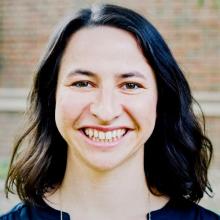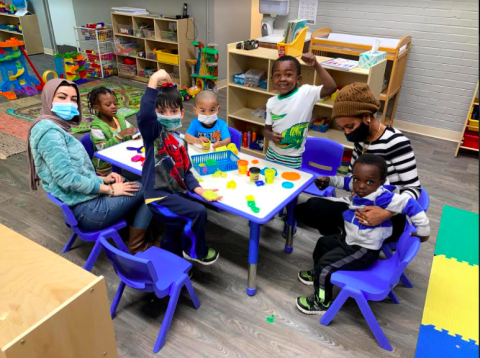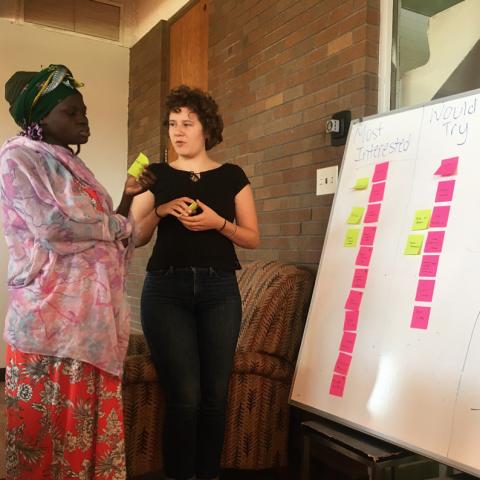Refugees Find Their Footing at Alumna’s Nonprofit
The Village Institute helps single mothers build meaningful careers
“Let’s talk for a minute about moving,” Ellie Adelman says, looking into the camera. “If you’ve ever moved to a new place, even across town, you know there’s a lot that goes into it.”
You need to find an apartment, drive over to see it, fill out the application, secure a credit check, sign the lease, and pay the deposit and rent.
But what if you don’t have a job or a car or good credit or savings? What if you’re raising a child by yourself?
And what if you don’t speak English?
“Now this is starting to sound damn near impossible,” concludes Adelman (MSW ‘19).
The situation the University of Denver graduate is describing isn’t hypothetical — they are obstacles she regularly encountered in her work with refugee communities in the United States. It’s why she created the nonprofit Village Institute.
“I knew I wanted to have a holistic place where refugee families could live and adjust to life in the U.S. in a way that felt really supportive,” says Adelman, who carried the idea to Denver when she enrolled at DU’s Graduate School of Social Work, drawn by its focus on social justice. An internship with Denver’s African Community Center connected her with single mother refugees. Everything began to click.
These women were entrepreneurial enough to survive violent situations, brave enough to leave them and strong enough to raise their families in a new country. All they needed was a little extra “scaffolding,” as she calls it.
At the Village Institute, Adelman provides opportunities for women who have the drive and desire to succeed but lack stability and support.
“It starts as a basic needs provider, but the long-term vision is for refugee women in our program to build financial sustainability, build wealth and build a meaningful career for themselves,” Adelman says. “If they don’t have stable housing or child care that works for their schedule and their budget, they’re not going to be able to open a business. If they don’t have the business training, they may not have a successful and sustainable business.”
After securing space in an Aurora building, the Village Institute welcomed its first cohort of single mothers in May 2020, featuring families from Burma, Eritrea, Sudan and Rwanda. With their housing provided, taken care of, the refugee women focus on job training and integration into their local communities. Nonresident refugee and immigrant women lead a multicultural child-care center, The Little Village, that serves as a day care and early learning program. Already, in its first few months of operation, kids, families and teachers at The Little Village have built a tight-knit community across nine countries and at least as many languages.
Adelman’s experience lies in international development and peacebuilding, but after years of working abroad, she chose to move back to the U.S. to be closer to her family. Aiding refugees quickly rose to the top of her list of potential careers, given her passion for working with women and girls around the world and her heritage as a fourth-generation Jewish immigrant.
Adelman says the idea for the Village Institute always felt clear in her head, but not until she enrolled at DU and GSSW did she truly put pen to paper.
“The social work program really gave me the tools and the language to both talk about [and] operationalize equity within our organization,” she says. “It really helped me to understand the impact I have and can have as a white person and all of the consideration that requires for me to do meaningful and equitable work in a population that’s from all over the world and with a lot of different experiences.”
The biggest boost to the Village Institute came from the University’s entrepreneurship programming, then known as Project X-ITE. Securing a Chancellor’s Global Innovation Fellowship allowed her to run brainstorming workshops that brought ideas from community thought leaders. At Project X-ITE’s Pioneering Summer and XLR8 programs, Adelman crafted her business model and her pitch to investors.
That also gave her the confidence to begin calling herself a founder and entrepreneur, says Nina Sharma, former executive director of Project X-ITE.
“She was a social worker, she was a giver, she was the most magnanimous person, but she wasn’t an entrepreneur, at least in her mind. But to me she was the absolute definition of entrepreneur,” Sharma says. “Her goal was never to run a business and make money. Her goal is to serve people. … She’s figured out how to make a living, sustain her own life, while helping build and sustain other people’s lives as well.”
Being a “startup founder” can get a bad rap, Sharma says, associated with widgets and apps in affluent, male-dominated Silicon Valley. But Adelman — despite her facetious crowning as Project X-ITE’s “Unlikeliest Capitalist” — embodies the business world at its best.
“She didn’t set out to do this, but she’s a problem-solver,” Sharma says. “And I think, at the end of the day, that’s all an entrepreneur is. Building an entrepreneurial mindset really means being able to identify problems and figure out ways to solve them and not being afraid to try and fail and try again.”
Adelman also credits the Barton Institute and its social enterprise fellowship for helping develop her into a social entrepreneur.
In the year ahead, the Village Institute is focused on expansion and fortification. In the wake of the COVID pandemic, Adelman launched the Essential Careers Pathway Program, funded by the Colorado Health Foundation and geared toward mental health and health care career development. Adelman also wants to provide more on-site job support and grow the enrollment of The Little Village. All the while, the nonprofit hopes to boost its fundraising and buy the building it’s in — a step toward longevity for Adelman’s vision. The results she has seen to this point prove that her model can succeed, and her work is worth it.
“It is at the same time incredibly overwhelming and really, really beautiful,” she says. “There are times we have events or moments of interaction with the families that give me a glimpse at why we did this, why my advisory team and I put in all the work. It’s special to see it starting to happen.”











